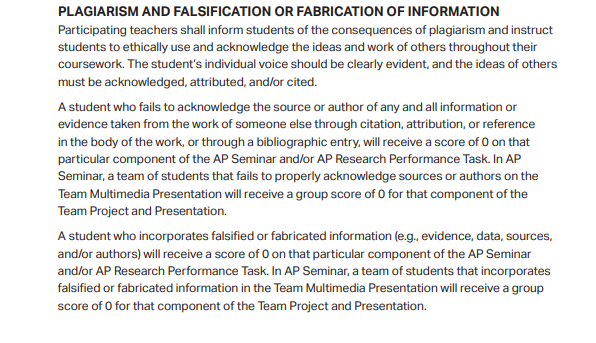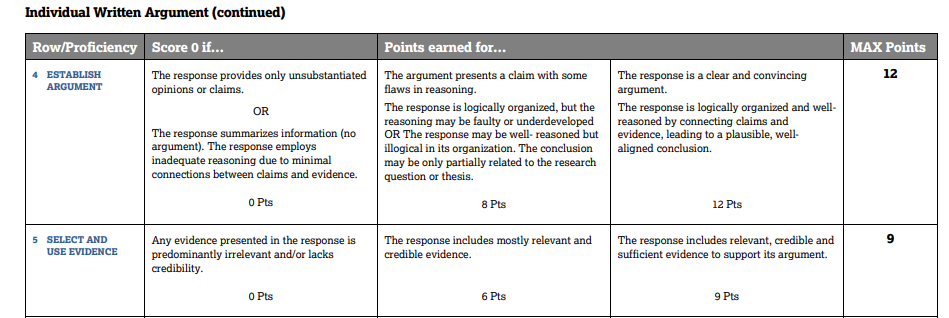Big Idea 4: Synthesize Ideas
8 min read•december 29, 2022
Steven Kucklick
Steven Kucklick
AP Seminar 💬
13 resourcesSee Units
Overview of Big Idea 4
We are almost to the end of the big ideas!! (Almost . . .) I know I've said it before, but this Big Idea is important too!
Big Idea 4 covers the crucial act of taking all of your evidence and claims and turning them into one coherent argument. In a lot of ways, this is the most important thing you do in AP Seminar. Yes, you gather evidence, and think about arguments and perspectives, but at the end of the day you have to actually do something with them.
Synthesize: to combine (a number of things) into a coherent whole
Think about it like this: if you want to build a house, you need to gather all of the instructions on how to build it. Then, you need to get all of the tools and supplies to put it together. But, if you stop there, you won't have a house. You have all the supplies and knowledge, but no house. You have to build the darn thing!
That is what Big Idea 4 is all about: building the house.

Image from Giphy
Essential Questions of Big Idea 4
Let's tackle the essential questions first.
- How do I connect and analyze the evidence in order to develop an argument and support a conclusion?
- What line of reasoning and evidence would best support my argument? Is my reasoning logical?
- Are there other conclusions I should consider?
- What am I taking for granted? How do I acknowledge and account for my own biases and assumptions?
- What is the best way to acknowledge and attribute the work of others that was used to support my argument?
- How can I avoid plagiarism?
The EQs in BI 4 are asking you to combine ideas that we talked about in earlier unit guides. Things like line of reasoning and thinking about multiple perspectives are all things that we've talked about earlier.
There are really only two new ideas here. Just two!
- Connecting and analyzing evidence 👉 👈
- Avoiding plagiarism ✍️
We are going to mostly focus on these two ideas, but I will bring in these old ideas as we go.
Connecting and Analyzing Evidence
You'll hear the word 'evidence' A LOT in Seminar. Do you have enough evidence? Is it good evidence? Do you have a wide variety of evidence? Things can get overwhelming very quick. So let's break it down.
What is Evidence?
First of all, what the heck is evidence? Evidence is anything that supports your claims. If your claim is that it's too hot outside, your evidence would be the temperature. Easy enough, right? With more complex claims, you'll need more than just one number or fact. Looking for good evidence, and a wide variety of it, can get tricky.
Finding "Good" Evidence
The idea of "good" evidence can be very subjective. Any evidence that is well-corroborated and not opinionated can be considered good evidence. However, you need to be looking for evidence that is good for YOUR claims.
For example, if you have focused your argument and claims around a historical lens and you bring in a piece of evidence written by a nutritionist, does that evidence really fit your claims and argument? Certainly it brings in a different perspective, but does it actually add anything to your specific argument? Furthermore, are you explaining clearly how this piece of evidence adds to your argument? These are the questions you should ask yourself.
Where to Look for Evidence
Physically finding evidence can be tricky. My recommendation is to stay away from Google searches. Typically, just Googling won't get you consistently good evidence.
Instead, find out what databases your school has access to. Scholarly databases such as JSTOR and Google Scholar, Google'’s scholarly database, give a lot of options for finding strong evidence. You will definitely have access to EBSCO, a database that all Seminar students are granted access to.
Finally, I highly recommend checking out your local library. Libraries are treasure troves of information. Work with a librarian and they will, at the very least, point you in the right direction. Often times they will really help you find what you need!
Don't be in the tricky situation of not having good evidence because you can't find it. It's out there, you just have to get it!
Research Tip: If you're having trouble finding evidence, ask your teacher for help as early as you can.
Research Tip: If you plan to use library sources, do a quick search through their catalog as soon as you can. It'll mean you have your sources on hand as soon as possible. (Catalog searches are also sort of a fun way to procrastinate on actual writing. 😉)
How to Analyze Evidence
One moment of high school English that is etched into my mind is when I learned how to properly use a quote in a paper. Before this moment in English 2, I thought that I could just throw a quote in by itself and the job was done. This is not the case. Quotes without context are, as one teacher of mine put it, like dead fish in the middle of your paper. 🐠
You need to work a quote naturally into a sentence to support some previous statement or idea. Doing this makes the quote a valuable part of whatever essay or paper you're writing, like one of a school of fish working together to get through the ocean.
The reason I bring this is up is because you need to take the same approach with evidence. Just throwing evidence into a paragraph does nothing to support the claims that you have made. It's a dead fish. Just like a quote with no context does not add anything to an essay, evidence without proper analysis adds nothing to your argument.
In order to analyze evidence, you need to think about three questions:
- How does this evidence support my claim?
- Why is this evidence reliable?
- Are there pitfalls or shortcomings with this evidence?
- Why am I using this evidence? Is this the best evidence I can find for this claim?
Whenever you use evidence, you should be answering all three of these questions.
For a more detailed guide to analyzing evidence, check out Big Idea 2: Understand and Analyze
How to Connect Evidence
Lastly, you need to connect your evidence. This is an important part of using evidence to its full effect. A piece of evidence needs to be in a conversation with the other evidence that you've used. If you bring in four pieces of evidence to support a claim, you should be thinking about how each piece of evidence interacts with the other pieces.
Here are some questions to consider:
- Does the evidence support other evidence given?
- Does the evidence change how you look at one or several other pieces of evidence?
- Does the evidence add context to another piece of evidence?
- Does the evidence refute or diminish one or several other pieces of evidence?
Just like you need to situate your evidence in the context of your claims, you need to situate your evidence in the context of your other evidence.
Research Tip: Take a look at how other researchers analyze and connect pieces of evidence. You can borrow some of their connection methods, such as the transitions they use, for your own papers. Be careful not to plagiarize!
Avoiding Plagiarism
What is Plagiarism?

College Board Plagiarism Policy
Above is the College Board's official policy on plagiarism. You definitely need to read it, but I am also going to sum it up very simply here.
Anything that you pass off as your own, when it isn't, is plagiarism. This applies to all forms of medium, not just written works. Pictures, videos, and art all need to be properly cited.
Often plagiarism is not done on purpose and is accidental. You might have forgot to cite, or you thought a previous citation was sufficient... However, accidental plagiarism is still plagiarism. Be as detail oriented as you can with citations, and if you have any questions it's always better to ask.
🔥 Quick Tip: We will go into more detail about citations in the Performance Task unit guides, so look for that information there!
How to Avoid Plagiarism
The best way to avoid plagiarism is to cite everything unless you are 100% sure you don't have to.
When in doubt, cite it out!
Double and triple check your citations to make sure they all match up and there aren't any gaps.
College Board does help a little bit with this. When you submit your IRR and your IWA, an originality report will be run, and your paper will be compared to whatever can be found online. This isn't perfect, as it doesn't take into account your citations, but it does highlight areas that should be cited. This is a good way to make sure that you have cited everything you need to.
How Big Idea 4 Relates to the Exam
Performance Task 1

Performance Task 1 Rubrics

Performance Task 1 Rubrics
PT 1 focuses heavily on gathering evidence and how you use it. As we can see with the IRR, twelve points are devoted just to the evidence you gather.

Performance Task 1 Rubrics
The TMP is less focused on evidence, but it is still important that you select meaningful evidence that you actively use in your presentation.
Performance Task 2

Performance Task 2 Rubrics
The IWA in PT 2 is more of a traditional argumentative research paper so it is going to rely heavily on your evidence and how you use it.
As we can see in row 5, it is not just about getting good evidence, but it is also about making sure it supports your argument.
End of Course Exam

End of Course Exam Rubrics
Even though it is in a more limited capacity, the End of Course exam also has you working with evidence. In Part A, you will need to evaluate the author's use of evidence and how credible it is. This goes beyond just saying whether the evidence is good or bad. You need actually explain why.

End of Course Exam Rubrics
In Part B you will also be using evidence, although it will be provided by College Board. You will still have to use it effectively to support your argument, but you will not have to search for it. An important aspect of Part B is synthesizing the ideas of the evidence they give you into one coherent argument.
In Conclusion
Synthesizing good evidence is an important part of what you will be doing in your Performance Tasks and on the End of Course exam. It's important to focus on gathering credible evidence that actively supports your claims. Without good evidence, an argument is not effective.
Browse Study Guides By Unit
🤨Big Idea 1: Question and Explore
🧐Big Idea 2: Understand and Analyze
👥Big Idea 3: Evaluate Multiple Perspectives
💡Big Idea 4: Synthesize Ideas
Big Idea 4: Synthesize Ideas
- Overview of Big Idea 4
- Essential Questions of Big Idea 4
- Connecting and Analyzing Evidence
- What is Evidence? 🔎
- Finding "Good" Evidence 💯
- Where to Look for Evidence 👀
- How to Analyze Evidence 🤔
- How to Connect Evidence 🤝
- Avoiding Plagiarism
- What is Plagiarism?
- How to Avoid Plagiarism
- How Big Idea 4 Relates to the Exam
- Performance Task 1
- Performance Task 2
- End of Course Exam
- In Conclusion
🗣Big Idea 5: Team, Transform, and Transmit
✏️Frequently Asked Questions
📝Exam Tasks & Guidance

© 2023 Fiveable Inc. All rights reserved.